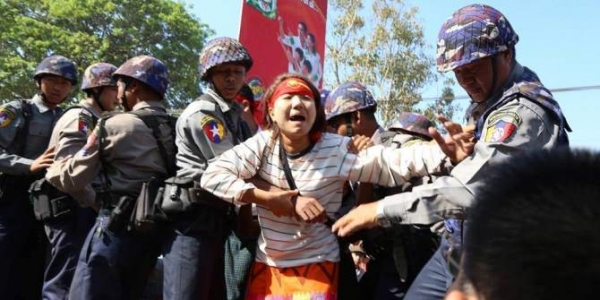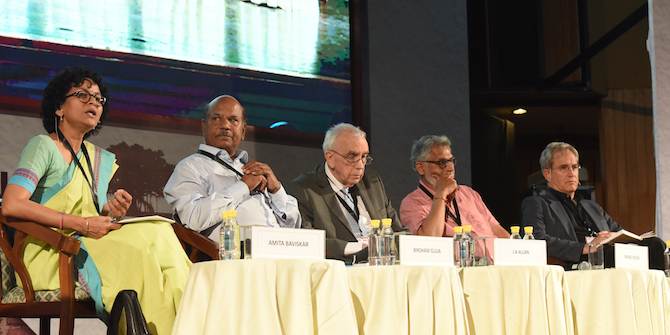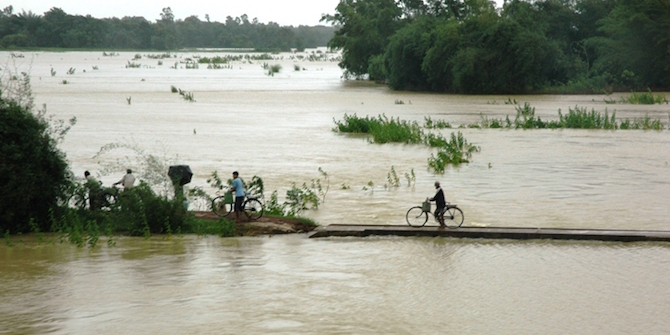
Conditions in Myanmar have changed sufficiently over the last few years to enable people to challenge everyday impunity in a way that would not previously have been possible. Nevertheless, Nick Cheesman draws on the case of Bangladesh to point to obstacles to aggrieved persons seeking redress for state violence. The continued political and economic power of Myanmar’s armed forces coupled with a corresponding absence of institutionalised legal avenues mean long-term structural changes will be key to successfully redressing grievances against state officers.
Writing in Paper Cadavers, Kirsten Weld observes that after the end of armed conflict and dictatorship in Guatemala,
“The military remained an influential source of political and financial clout, and a reconstituted police force only exacerbated its predecessors’ reputation for viciousness and corruption. Impunity reigned; everyday violence, sometimes perpetrated by state security forces, terrorised and distracted the population.”
Weld might very well have been writing about Myanmar today. With the election of a National League for Democracy government in 2015, overt political oppression has become a thing of the past. Nevertheless, soldiers continue to enjoy impunity for killing and torture in frontier regions, and the army quietly maintains its presence in practically all areas of political and economic life. Policemen, meanwhile, target the urban poor in response to a purported crime wave.
Myanmar’s five decades of experience with military rule might have been unusually protracted and peculiarly damaging, but in its general terms it is hardly unique. Among the country’s neighbours, both Bangladesh and Thailand have economically powerful and politically active armies. In each, military governments have engendered conditions of everyday impunity that have outlasted their administrations—conditions making it all but impossible for ordinary citizens to hold state officers to account for criminal acts, whether committed in the course of regular duties or in their private lives.
Additionally, Bangladesh has a history of British colonial occupation in common with Myanmar, hitherto Burma, and many of the two countries’ postcolonial institutions and juridical practices bear a striking resemblance. But whereas in Bangladesh military, paramilitary and civilian institutions have had to compete with one another for access to political and economic resources, in Myanmar, up until recently the army aggrandised its own institutions and personnel to the exclusion of others.
Times have changed, and Myanmar’s political transformation would appear to be bringing it closer politically, at least in terms of the role and place of the military and its proxies, to Bangladesh. If so, what can be learned from the experiences with everyday impunity of people in Bangladesh that might be instructive for their counterparts in Myanmar?
For one thing, vigorous electoral politics, civilian-led government and a vibrant media and civil society clearly do not necessarily suffice to make state officers accountable for criminal violence. In Bangladesh, an admixture of official unwillingness and inability to hold soldiers, police and paramilitaries to account for violent crimes has left the population vulnerable. Some state programs, initiated in the name of counterterrorism and national security, have made people far less secure than they would otherwise have been.

One of the most visible manifestations of impunity in Bangladesh is the Rapid Action Battalion (RAB), an elite anticrime and counterterror unit consisting of military and police personnel. Ever since its establishment in March 2004, RAB has operated virtually outside the purview of the law. According to Human Rights Watch, RAB was allegedly involved in more than 550 killings between 2004 and 2009 alone. Local human rights groups have documented in excess of a thousand killings.
Observing RAB getting away with murder, the police adopted the same methods, and hundreds of killings have since been attributed to them as well. Children, journalists, labour rights advocates, political activists, unarmed protesters and disadvantaged civilians have all become victims of so-called crossfires and faked encounters with alleged criminals or terrorists. Others who have survived potentially lethal attacks have, as is also the case in Myanmar, been made the targets of concocted criminal charges.
For another thing, everyday impunity in Bangladesh results not so much from formal provisions to protect perpetrators of the sort that are associated with large-scale amnesties for state-sponsored atrocities, or not only from such provisions, but rather from archaic regulatory arrangements that serve to protect soldiers and police from prosecution. Even after allegations of extrajudicial killings have been confirmed, perpetrators are at most punished with dishonorable discharge.
Many of these arrangements Myanmar inherited together with Bangladesh from British colonisers. Today, both countries want for institutions that ensure rigorous inquiry and fair adjudication of suspected ordinary offenders in regular cases, let alone when state officers are the accused. The poor quality of investigation, lack of procedural fairness and, in Bangladesh especially, trial delays all present obstacles to survivors of state violence or family members seeking justice.
Evidently, if the political changes in Myanmar give cause for optimism then the lessons from Bangladesh recommend the optimism be cautious. Conditions in Myanmar have changed sufficiently to enable people to say and do things in response to everyday impunity that they would not have been able to say or do just a few years ago. These changed conditions are encouraging more and more people to voice grievances, and are also raising expectations of redress.
In some cases, expectations are at least partly realised. But the continued political and economic power of Myanmar’s armed forces coupled with a corresponding absence of trustworthy, institutionalised legal avenues to have grievances heard and addressed all but guarantees that the struggle against everyday military impunity in Myanmar will be protracted and difficult. While not neglecting opportunities for short-term gains, human rights defenders there will also need to direct their energies towards long-term structural changes, absent of which impunity will remain a part of everyday life in Myanmar, as it is in Bangladesh.
This article draws on Nick Cheesman, Bina D’Costa and Tyrell Haberkorn, “Anticipating the Struggle against Everyday Impunity in Myanmar through Accounts from Bangladesh and Thailand”, Asia and the Pacific Policy Studies, vol. 3, no. 1 (2016), pp. 45-58, available for open access download or reading online here.
About the Author
Nick Cheesman is a fellow at the Department of Political and Social Change, Australian National University, and presently, a member of the Institute for Advanced Study, Princeton. He is the author of Opposing the Rule of Law: How Myanmar’s Courts Make Law and Order (Cambridge University Press, 2015).







